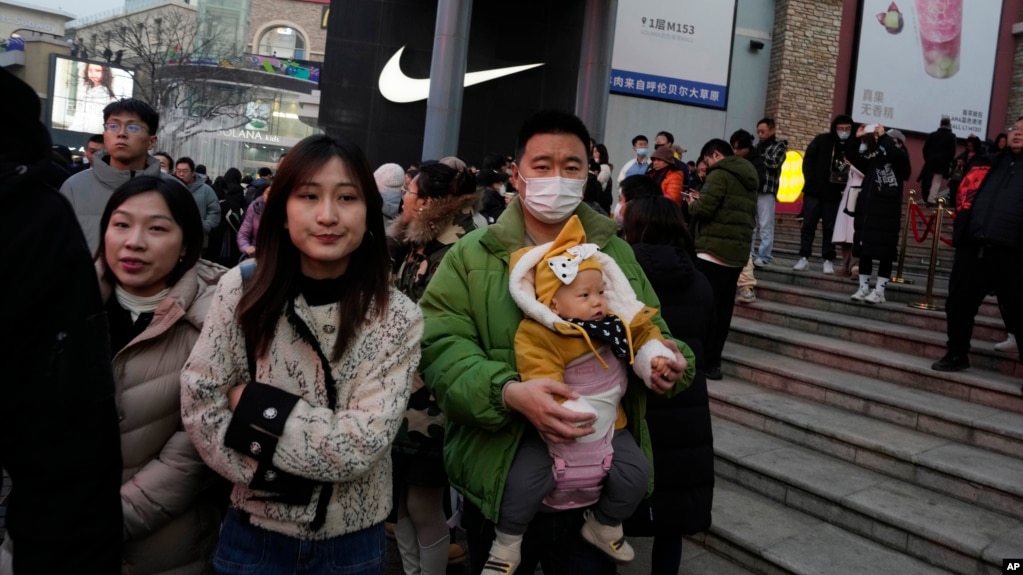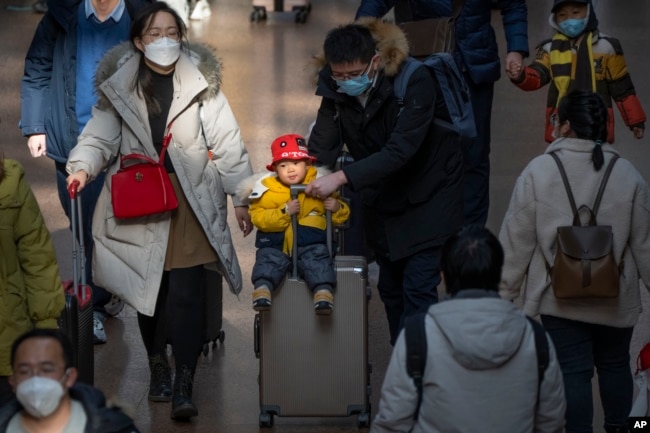AUDIO
Experts: China's 'Birth-friendly' Society at Odds with Urbanization Plans

Mary Meng, a busy worker at a Chinese technology company in Shanghai, says she cannot imagine having a second child.
"The work pressure is such that you don't even have any time to spend with your child," she said. "How can I think about taking care of two children? I have no idea."
Urban residents in many places might agree with Meng's statement. But researchers say the speed of population decrease and aging in China means the government should consider with more urgency the effect of this fast-moving, costly city life on birth rates.
At a recent top political gathering, China announced an effort to build a "birth-friendly society." It seeks to establish measures long-called for by population experts, such as lowering childcare and education costs.
But, the same experts are concerned that China’s new effort also promises to try to get more people into urban areas.

The plan aims to increase housing demand to support the property sector. It also aims for economic growth through increased productivity and consumption.
Urban residents generally produce and buy higher value-added goods and services than people in rural areas.
But critics say the government’s urbanization plan overlooks basic ideas about how populations operate in different places. In the cities, people have fewer children due to high housing costs, limited space, costly education, and because they spend most of their day at work.
Infertility rates among couples in China have risen from 2 percent in the 1980s to 18 percent. The international rate is around 15 percent. Doctors blame China’s infertility rise partly on stress related to urban jobs and industrial pollution.
China's top economic planner says recent data shows the 2020 fertility rate was 1.54 in China's rural areas. The nationwide rate was lower at 1.3.
The data also showed Shanghai's fertility rate in 2023 was 0.6. The national rate was 1.1.
To have a stable population, experts say countries need fertility rates of about 2.1.
Yi Fuxian is a doctor and top scientist with the School of Public Health at the University of Wisconsin-Madison in the United States. He says Chinese officials are "foolishly" driving young people to what he called “the most birth-unfriendly big cities.” This, he argues, will lead to continued decreases in fertility and worsen China’s aging crisis.
The expert said, "The suppression of fertility rates by population density is a biological law."
There is evidence to support this argument already in East Asia. Japan, South Korea and Taiwan all urbanized and industrialized faster than most other economies following World War Two. They also have the lowest fertility rates worldwide.
While China's birth rates are also very low after many years of a strict one-child policy, not all is lost.
At 65 percent, its urbanization rate is lower than the 80 to 90 percent rates in Japan or South Korea. This reality could give China ways to make valuable changes, population experts say.
Improving rural living standards with better public services or more liberal land rights would support long-term economic growth better than urbanization, researchers say.
"The population size is always a multiplier" in the economy, said Samir KC of the Asian Demographic Research Institute at Shanghai University.
Poppy Yu, 21, who works at a film production company in Beijing six to seven days a week, wants no children.
"I don’t have the money or energy," Yu said.
China's "birth-friendly society" effort includes bringing down costs of parenting and education and lengthening parental leave from work. It also proposes expanding medical care for mothers and children, and increasing tax forgiveness for parents.
Many countries offer such support. But those with successful birth policies - such as France or Sweden - stand out for their greater gender equality, better labor rights and strong social welfare.
Reducing childcare costs does not work on its own, said Yun Zhou, a social demographer at the University of Michigan in the United States. Instead, she argues, the policy pushes a set of family values “that demand women take domestic responsibilities.”
Mary Meng, the tech worker, believes no policy can work until Chinese people start hoping again for a better life, financially.
"Now everyone thinks there is no prospect at all," she said. "No matter how hard you work, it is just survival."
_______________________________________________
Words in This Story
urban – adj. of, relating to, characteristic of a city
consumption – n. the use of goods and services
fertility rate n. the average number of children born to women during their reproductive years
suppress – v. to restrain from a usual course or action; to inhibit the growth or development of
prospect – n. possibility; something that is awaited or expected
https://learningenglish.voanews.com/a/experts-china-s-birth-friendly-society-at-odds-with-urbanization-plans/7754054.html